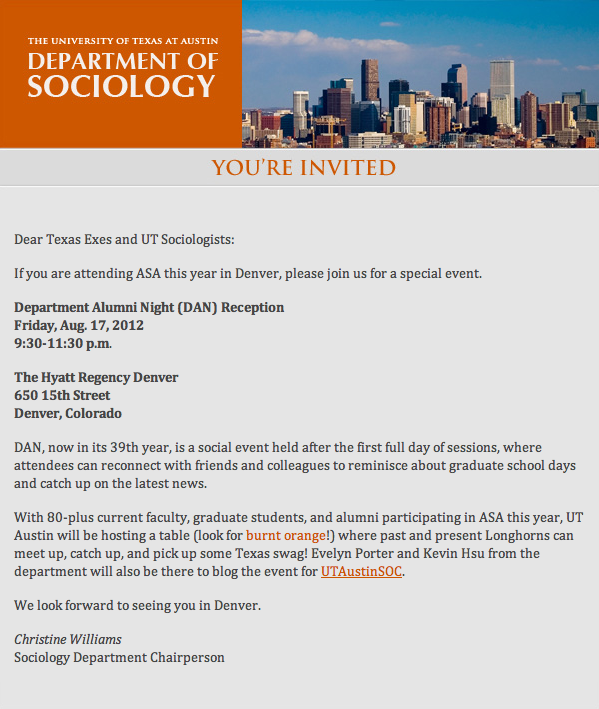“Real Utopias”
American Sociological Association 2012 Annual Meeting
August 17-20 · Denver, CO
Colorado Convention Center & Hyatt Regency
~ The University of Texas at Austin Program ~

Fri 8/17 Sat 8/18 Sun 8/19 Mon 8/20
Friday, August 17
top
Jacqueline L. Angel
Section on Aging and the Life Course Invited Session. What’s In a Name? Perspectives on the Sociology of Age, Aging, and the Life Course
Unit: Section Invited
Fri, Aug 17 – 4:30pm – 6:10pm
Panelist
Travis Beaver
Table 14. Culture, Politics, and Collective Action
Unit / Sub Unit: Section on Sociology of Culture / Section on Sociology of Culture Roundtables
Fri, Aug 17 – 4:30pm – 6:10pm
Presenter: Roller Derby Revolution: Sport as a Social Movement
Mounira Maya Charrad
Contemporary Sociology Editorial Board
Unit: Meetings
Scheduled Time: Fri, Aug 17 – 8:30am – 10:10am
Session Submission Role: Participant
Robert Crosnoe
Section on Children and Youth Business Meeting
Unit: Meetings
Scheduled Time: Fri, Aug 17 – 3:30pm – 4:10pm
Session Submission Role: Participant
Carmen Marie Gutierrez
Table 02. Incarceration, Parole, and Treatment Interventions
Unit / Sub Unit: Section on Crime, Law and Deviance / Section on Crime, Law, and Deviance Roundtables
Scheduled Time: Fri, Aug 17 – 4:30pm – 6:10pm
Presenter on individual submission: Dually Deviant: A Weberian and Durkheimian Perspective on the Reproductive Rights of Incarcerated Women
Mark D. Hayward
Section on Aging and the Life Course Business Meeting
Unit: Meetings
Scheduled Time: Fri, Aug 17 – 3:30pm – 4:10pm
Session Submission Role: Participant
Nicolette Denise Manglos
Section on Altruism, Morality and Social Solidarity Paper Session. Altruism, Morality and Social Solidarity: Envisioning Utopias
Unit / Sub Unit: Section on Altruism, Morality and Social Solidarity / Altruism, Morality and Social Solidarity: Envisioning Utopias
Scheduled Time: Fri, Aug 17 – 10:30am – 12:10pm
Presenter on individual submission: Haitian and Ghanaian Liturgy and Prayer as Constitutive-ends Practices
Michael Jason McFarland
Section on Aging and the Life Course Business Meeting
Unit: Meetings
Scheduled Time: Fri, Aug 17 – 3:30pm – 4:10pm
Session Submission Role: Participant
Megan Tobias Neely
Table 09. Employment and Gender
Unit / Sub Unit: Section on Global and Transnational Sociology / Section on Global and Transnational Sociology Roundtables (one-hour)
Scheduled Time: Fri, Aug 17 – 4:30pm – 5:30pm
Presenter on individual submission: Women Political Executives on Women’s Rights: A Shifting Framework
Pamela Jane Neumann
Regular Session. Development and Gender
Unit: Development and Gender
Scheduled Time: Fri, Aug 17 – 10:30am – 12:10pm
Presenter on individual submission: Empowerment Paradox: Volunteer Mothering as Community Participation in Nicaragua
Evangeleen Pattison
Regular Session. Inequalities in College Access and Completion
Unit: Higher Education, Sociology of.
Scheduled Time: Fri, Aug 17 – 2:30pm – 4:10pm
Presenter on individual submission: Changes in Ascribed and Achieved Advantage in American Higher Education
Pamela M. Paxton
Section on Global and Transnational Sociology Paper Session. Gender, Globalization, and Transnationalism
Unit / Sub Unit: Section on Global and Transnational Sociology / Gender, Globalization, and Transnationalism
Scheduled Time: Fri, Aug 17 – 2:30pm – 4:10pm
Presenter on individual submission: Transnational Women’s Activism and the Global Diffusion of Gender Quotas
Catherine E. Ross
Table 05. Families across the Life Course
Unit / Sub Unit: Section on Aging and the Life Course / Section on Aging and the Life Course Roundtables
Scheduled Time: Fri, Aug 17 – 8:30am – 10:10am
Presenter on individual submission: Preferences for Remarriage among the Widowed and Divorced
Sharmila Rudrappa
Contexts Editorial Board
Unit: Meetings
Scheduled Time: Fri, Aug 17 – 4:30pm – 6:10pm
Session Submission Role: Participant
Section on Asia and Asian America Invited Session. Asia and Migration: New Directions in the New Global Economy
Unit: Section Invited
Scheduled Time: Fri, Aug 17 – 10:30am – 12:10pm
Presenter on individual submission: Gay Dads and Indian Surrogates
Connor Sheehan
Table 19. Drugs and Drug Use
Unit: Open Refereed Roundtables
Scheduled Time: Fri, Aug 17 – 2:30pm – 4:10pm
Presenter on individual submission: Drug Prevalence Differentials in Violent Deaths
Angela R. Stroud
Table 03. Inequality and Crime
Unit / Sub Unit: Section on Crime, Law and Deviance / Section on Crime, Law, and Deviance Roundtables
Scheduled Time: Fri, Aug 17 – 4:30pm – 6:10pm
Presenter on individual submission: Is Concealed Handgun Licensing Motivated by Fear of Crime?
Debra Umberson
Section on Aging and the Life Course Business Meeting
Unit: Meetings
Scheduled Time: Fri, Aug 17 – 3:30pm – 4:10pm
Session Submission Role: Participant
Andres Villarreal
American Sociological Review Editorial Board
Unit: Meetings
Scheduled Time: Fri, Aug 17 – 8:30am – 10:10am
Session Submission Role: Participant
Michael P. Young
2013 W.E.B. Dubois Award for Distinguished Scholarship Selection Committee
Unit: Meetings
Scheduled Time: Fri, Aug 17 – 8:30am – 10:10am
Session Submission Role: Participant
Alumni
Sinikka Elliott (PhD, 2008)
Regular Session. Food and Agriculture
Unit: Food and Agriculture
Scheduled Time: Fri, Aug 17 – 8:30am – 10:10am
Presenter on individual submission: Bringing Sociology to the Table: A Case for a Sociological Approach to the “Obesity Epidemic”
ChangHwan Kim (PhD, 2008)
Section on Methodology Paper Session. Open Topic 1
Unit / Sub Unit: Section on Methodology / Open Topic (2 sessions)
Scheduled Time: Fri, Aug 17 – 4:30pm – 6:10pm
Presenter on individual submission: Do Proxy Responders Report Earnings Accurately? Gender and Marital Status Effects of Proxy Responses
Jenny Trinitapoli (PhD, 2009)
Regular Session. Kinship and Pathways of Support
Unit: Family and Kinship
Scheduled Time: Fri, Aug 17 – 8:30am – 10:10am
Presenter on individual submission: Sibling Support among Young Adults in Malawi
Sara Yeatman (PhD, 2008)
Regular Session. Kinship and Pathways of Support
Unit: Family and Kinship
Scheduled Time: Fri, Aug 17 – 8:30am – 10:10am
Non-Presenter on individual submission: Sibling Support among Young Adults in Malawi
Saturday, August 18
top
Lady Anima Adjepong
Table 07. Table 32. Sport and Sport Cultures
Unit: Open Refereed Roundtables
Sat, Aug 18 – 2:30pm – 4:10pm
Presenter: Play-forms of Association: An Examination of How Women’s Rugby Teams Develop Sociability and Organic Solidarity
Jacqueline L. Angel
Section on Sociology of Population Paper Session. Disciplines and Demography: Finding the Sociology in Population Processes
Unit / Sub Unit: Section on Sociology of Population / Disciplines and Demography: Finding the Sociology in Population Processes
Sat, Aug 18 – 8:30am – 10:10am
Presenter: Contextualizing Financial Strain in the Older Latino Population
Ronald J. Angel
Journal of Health and Social Behavior Editorial Board
Unit: Meetings
Sat, Aug 18 – 8:30am – 10:10am
Participant
Julie Anne Beicken
Table 04. Medicine and Health
Unit / Sub Unit: Section on Science, Knowledge and Technology / Section on Science, Knowledge and Technology Roundtables
Sat, Aug 18 – 8:30am – 9:30am
Presenter: Scientific Knowledge Production and the Creation of “Feeblemindedness”: A Foucauldian Approach to the Eugenics Movement
Dustin C. Brown
Regular Session. Biosociology/Biosocial Interaction
Unit: Biosociology/Biosocial Interaction
Sat, Aug 18 – 10:30am – 12:10pm
Presenter: Does Marriage Lower Biological Risk among Older Adults?
Shannon Cavanagh
Social Psychology Quarterly Editorial Board
Unit: Meetings
Scheduled Time: Sat, Aug 18 – 8:30am – 10:10am
Session Submission Role: Participant
Mounira Maya Charrad
Section on Political Sociology Invited Session. Is There a Politics of Law or a Legality of Politics?
Unit: Section Invited
Scheduled Time: Sat, Aug 18 – 10:30am – 12:10pm
Session Submission Role: Panelist
Wenhong Chen
Table 05. Politics
Unit: Open Refereed Roundtables
Scheduled Time: Sat, Aug 18 – 2:30pm – 4:10pm
Presenter on individual submission: Media Use and Civic Engagement in Western China
Robert Crosnoe
Sociology of Education Editorial Board
Unit: Meetings
Scheduled Time: Sat, Aug 18 – 12:30pm – 2:10pm
Session Submission Role: Participant
Carlos Diaz-Venegas
Section on Sociology of Population Paper Session. Disciplines and Demography: Finding the Sociology in Population Processes
Unit / Sub Unit: Section on Sociology of Population / Disciplines and Demography: Finding the Sociology in Population Processes
Scheduled Time: Sat, Aug 18 – 8:30am – 10:10am
Presenter on individual submission: Contextualizing Financial Strain in the Older Latino Population
Mark D. Hayward
Journal of Health and Social Behavior Editorial Board
Unit: Meetings
Scheduled Time: Sat, Aug 18 – 8:30am – 10:10am
Session Submission Role: Participant
Regular Session. Biosociology/Biosocial Interaction
Unit: Biosociology/Biosocial Interaction
Scheduled Time: Sat, Aug 18 – 10:30am – 12:10pm
Non-Presenter on individual submission: Does Marriage Lower Biological Risk among Older Adults?
Robert A. Hummer
Journal of Health and Social Behavior Editorial Board
Unit: Meetings
Scheduled Time: Sat, Aug 18 – 8:30am – 10:10am
Session Submission Role: Participant
Hortencia Jimenez
Section on Latino/a Sociology Business Meeting
Unit: Meetings
Scheduled Time: Sat, Aug 18 – 1:30pm – 2:10pm
Session Submission Role: Participant
David Michael McClendon
Section on Sociology of Population Paper Session. Population, Environment, and Context
Unit / Sub Unit: Section on Sociology of Population / Population, Environment, and Context
Scheduled Time: Sat, Aug 18 – 12:30pm – 2:10pm
Presenter on individual submission: Where It’s Easier Being Blue: The Second Demographic Transition and IVF Utilization in the United States
Michael Jason McFarland
Regular Session. Biosociology/Biosocial Interaction
Unit: Biosociology/Biosocial Interaction
Scheduled Time: Sat, Aug 18 – 10:30am – 12:10pm
Presenter on individual submission: Does Marriage Lower Biological Risk among Older Adults?
Christian Luis Paredes
Section on Human Rights Paper Session. Human Rights of Migrants
Unit / Sub Unit: Section on Human Rights / Human Rights of Migrants
Scheduled Time: Sat, Aug 18 – 12:30pm – 2:10pm
Non-Presenter on individual submission: Coercive Immigration Enforcement and Bureaucratic Ideology
Pamela M. Paxton
Regular Session. Cross-National Sociology
Unit: Cross-National Sociology
Scheduled Time: Sat, Aug 18 – 12:30pm – 2:10pm
Session Submission Role: Session Organizer
Catherine Riegle-Crumb
Sociology of Education Editorial Board
Unit: Meetings
Scheduled Time: Sat, Aug 18 – 12:30pm – 2:10pm
Session Submission Role: Participant
Bryan Rees Roberts
Section on Community and Urban Sociology Invited Session. Utopia or Dystopia? Comparing Cities in the Global North/Global South
Unit: Section Invited
Scheduled Time: Sat, Aug 18 – 10:30am – 12:10pm
Session Submission Role: Panelist
Keith D. Robinson
Sociology of Education Editorial Board
Unit: Meetings
Scheduled Time: Sat, Aug 18 – 12:30pm – 2:10pm
Session Submission Role: Participant
Nestor P. Rodriguez
Section on Human Rights Paper Session. Human Rights of Migrants
Unit / Sub Unit: Section on Human Rights / Human Rights of Migrants
Scheduled Time: Sat, Aug 18 – 12:30pm – 2:10pm
Presenter on individual submission: Coercive Immigration Enforcement and Bureaucratic Ideology
Dara Renee Shifrer
Regular Session. Social Psychology
Unit: Social Psychology
Scheduled Time: Sat, Aug 18 – 8:30am – 10:10am
Presenter on individual submission: A Mixed Methods Study of How Socioeconomic Status is Associated with Adolescents’ Sense of Control
Section on Social Psychology Paper Session. Social Psychology and Inequality
Unit / Sub Unit: Section on Social Psychology / Open Topic on Social Psychology (2 sessions)
Scheduled Time: Sat, Aug 18 – 10:30am – 12:10pm
Presenter on individual submission: Regional Differences in Adolescents’ Locus of Control: Social Disadvantage or Cultural Exceptionalism?
Robert Sitko
Regular Session. Consumption and Economic Inequality
Unit: Consumers and Consumption
Scheduled Time: Sat, Aug 18 – 2:30pm – 4:10pm
Session Submission Role: Presider
Amanda Jean Stevenson
Table 03. Inequality
Unit / Sub Unit: Section on Sociology of Population / Section on Sociology of Population Roundtables (one-hour)
Scheduled Time: Sat, Aug 18 – 2:30pm – 3:30pm
Presenter on individual submission: The Effect of First Interbirth Interval on Women’s Poverty at Midlife
Mary Esther Sullivan
Table 02. Housing and Inequality
Unit / Sub Unit: Section on Community and Urban Sociology / Section on Community and Urban Sociology Roundtables (one-hour)
Scheduled Time: Sat, Aug 18 – 12:30pm – 1:30pm
Presenter on individual submission: Informal Development in Low-income Communities: Housing Conditions and Self-help Strategies in Informal Subdivisions in Texas
April M. Sutton
Section on Social Psychology Paper Session. Social Psychology and Inequality
Unit / Sub Unit: Section on Social Psychology / Open Topic on Social Psychology (2 sessions)
Scheduled Time: Sat, Aug 18 – 10:30am – 12:10pm
Non-Presenter on individual submission: Regional Differences in Adolescents’ Locus of Control: Social Disadvantage or Cultural Exceptionalism?
Margaret Tate
Regular Session. Visual Sociology
Unit: Visual Sociology
Scheduled Time: Sat, Aug 18 – 12:30pm – 2:10pm
Presenter on individual submission: Representing Social Invisibility: Aesthetics of the Ghostly in Rebecca Belmore’s Named and Unnamed
Debra Umberson
Journal of Health and Social Behavior Editorial Board
Unit: Meetings
Scheduled Time: Sat, Aug 18 – 8:30am – 10:10am
Session Submission Role: Participant
Professional Development Workshop. ASA Editors Offer Insights and Advice on Writing and Submitting Articles
Unit: Professional Workshop
Scheduled Time: Sat, Aug 18 – 10:30am – 12:10pm
Session Submission Role: Panelist
Christine L. Williams
Regular Session. Consumption and Economic Inequality
Unit: Consumers and Consumption
Scheduled Time: Sat, Aug 18 – 2:30pm – 4:10pm
Session Submission Role: Session Organizer
Alumni
ChangHwan Kim (PhD, 2008)
Regular Session. Asians and Asian Americans: Economic and Educational Processes
Unit: Asians and Asian Americans
Scheduled Time: Sat, Aug 18 – 2:30pm – 4:10pm
Presenter on individual submission: Are Asian American Women Advantaged? Labor Market Performances of College Educated Female Workers
Jennifer Karas Montez (PhD, 2011)
Section on Sociology of Population Paper Session. Disciplines and Demography: Finding the Sociology in Population Processes
Unit / Sub Unit: Section on Sociology of Population / Disciplines and Demography: Finding the Sociology in Population Processes
Scheduled Time: Sat, Aug 18 – 8:30am – 10:10am
Presenter on individual submission: How do Parents’ and One’s Own Education Accumulate to Shape Adult Health?
Wei Zhang (PhD, 2008)
Regular Session. Asians and Asian Americans: Economic and Educational Processes
Unit: Asians and Asian Americans
Scheduled Time: Sat, Aug 18 – 2:30pm – 4:10pm
Presenter on individual submission: Discrimination and Psychological Distress among Asian Americans: Exploring the Moderating Effect of Education
Table 02. Mental Health of Asians and Asian Americans
Unit / Sub Unit: Section on Sociology of Mental Health / Section on Sociology of Mental Health Roundtables (one-hour)
Scheduled Time: Sat, Aug 18 – 10:30am – 11:30am
Session Submission Role: Table Presider
Presenter on individual submission: English Proficiency and Psychological Distress among Latinos and Asian Americans
Sunday, August 19
top
Ellyn Margaret Arevalo
Table 10. Relationships and Sex Among Young Adults
Unit / Sub Unit: Section on the Sociology of the Family / Section on the Sociology of the Family Roundtables (one-hour)
Sun, Aug 19 – 2:30pm – 3:30pm
Presenter: Relationship Formation Processes Among Emerging Adult Men and Women
Kathleen H. Averett
Section on Sex and Gender Paper Session. Youth and Children Transgressing Gender Boundaries
Unit / Sub Unit: Section on Sex and Gender / Youth and Children Transgressing Gender Boundaries
Sun, Aug 19 – 8:30am – 10:10am
Presenter: Anxious Publics, Disruptive Bodies: The Case of the Transgender Girl Scout
Sergio Antonio Cabrera
Regular Session. Consumer Citizenship
Unit: Consumers and Consumption
Scheduled Time: Sun, Aug 19 – 4:30pm – 6:10pm
Session Submission Role: Presider
Ben Carrington
Section on Sex and Gender Invited Session. The State of Masculinities Studies: Current Trends and Future Directions
Unit: Section Invited
Scheduled Time: Sun, Aug 19 – 10:30am – 12:10pm
Session Submission Role: Panelist
Shannon Cavanagh
Section on the Sociology of the Family Paper Session. Family Structure and Children’s Well-being
Unit / Sub Unit: Section on the Sociology of the Family / Family Structure and Children’s Well-Being
Scheduled Time: Sun, Aug 19 – 8:30am – 10:10am
Non-Presenter on individual submission: Family Trajectories and School Readiness in the United States and the United Kingdom
Mounira Maya Charrad
Section on Comparative-Historical Sociology Council and Business Meeting
Unit: Meetings
Scheduled Time: Sun, Aug 19 – 8:30am – 10:10am
Session Submission Role: Participant
Section on Comparative-Historical Sociology Paper Session. Modernity Reconfigured: Post-colonial Theory and Comparative-Historical Sociology
Unit / Sub Unit: Section on Comparative-Historical Sociology / Modernity Reconfigured: Postcolonial Theory and Comparative-Historical Sociology
Scheduled Time: Sun, Aug 19 – 10:30am – 12:10pm
Presenter on individual submission: Modernity, Islam and Gender: Post-colonial Perspectives
Gloria Gonzalez-Lopez
Policy and Research Workshop. New Ethical Challenges in Qualitative Research (sponsored by the Committee on Professional Ethics)
Unit: Research/Policy Workshop
Scheduled Time: Sun, Aug 19 – 8:30am – 10:10am
Session Submission Role: Co-Leader
Katherine Christine Jensen
Research Poster Session. Communicating Sociology
Unit / Sub Unit: Poster Presentations / Communicating Sociology
Scheduled Time: Sun, Aug 19 – 2:30pm – 4:10pm
Presenter on individual submission: Lessons from the Spatial Margins in Argentine Memory-making: Sites of Memory in Buenos Aires
Amy C. Lodge
Section on Medical Sociology Paper Session. Social Networks, Social Support, and Health Across the Life Span
Unit / Sub Unit: Section on Medical Sociology / Social Networks, Social Support, and Health Across the Life Span
Scheduled Time: Sun, Aug 19 – 8:30am – 10:10am
Presenter on individual submission: Parenthood and Physical Activity across the Life Course: How do Gender and Race Matter?
Nicolette Denise Manglos
Theory Section Invited Session. Agency or Personhood?
Unit: Section Invited
Scheduled Time: Sun, Aug 19 – 10:30am – 12:10pm
Session Submission Role: Panelist
Catherine McNamee
Table 14. Marriage Values and the Value of Marriage
Unit / Sub Unit: Section on the Sociology of the Family / Section on the Sociology of the Family Roundtables (one-hour)
Scheduled Time: Sun, Aug 19 – 2:30pm – 3:30pm
Presenter on individual submission: Race-ethnic Differences at Remarriage and the Role of Pro-nuptial Values
Chandra Muller
Table 03. Cultural and Sociopolitical Representations
Unit / Sub Unit: Section on Disability and Society / Section on Disability and Society Roundtables (one-hour)
Scheduled Time: Sun, Aug 19 – 8:30am – 9:30am
Non-Presenter on individual submission: Racial Minorities in High School Disproportionately Labeled with Learning Disabilities
Christian Paredes
Section on International Migration Paper Session. Migrating People, Migrating Culture
Unit / Sub Unit: Section on International Migration / Migrating People, Migrating Culture
Scheduled Time: Sun, Aug 19 – 10:30am – 12:10pm
Presenter on individual submission: Using Media in Foreign Languages: an Analysis of Cultural Proximity and Cosmopolitanism in Austin, Texas
Pamela M. Paxton
Regular Session. Social Capital, Trust, and Well-being
Unit: Social Capital
Scheduled Time: Sun, Aug 19 – 2:30pm – 4:10pm
Presenter on individual submission: Do Social Connections Create Trust? A Longitudinal Analysis
Mark D. Regnerus
Table 10. Relationships and Sex Among Young Adults
Unit / Sub Unit: Section on the Sociology of the Family / Section on the Sociology of the Family Roundtables (one-hour)
Scheduled Time: Sun, Aug 19 – 2:30pm – 3:30pm
Non-Presenter on individual submission: Relationship Formation Processes Among Emerging Adult Men and Women
Catherine Riegle-Crumb
Section on Sociology of Education Paper Session. Gender Differences in Education
Unit / Sub Unit: Section on Sociology of Education / Open Topic on Sociology of Education (6 sessions)
Scheduled Time: Sun, Aug 19 – 10:30am – 12:10pm
Session Submission Role: Presider
Brandon Andrew Robinson
Table 03. Sexuality, Health, and Meaning-Making
Unit / Sub Unit: Section on Sociology of Sexualities / Section on Sociology of Sexualities Roundtables (one-hour)
Scheduled Time: Sun, Aug 19 – 8:30am – 9:30am
Presenter on individual submission: In Defense of Barebacking and Sexual Risk Taking: Weberian Perspective on Rationalization, Discipline, and Disenchantment
Dara Renee Shifrer
Section on Medical Sociology Paper Session. The Causes and Consequences Illness-related Stigma
Unit / Sub Unit: Section on Medical Sociology / The Causes and Consequences Illness-related Stigma
Scheduled Time: Sun, Aug 19 – 10:30am – 12:10pm
Presenter on individual submission: Stigma of a Label: Educational Expectations for High School Students Labeled with a Learning Disability
Table 03. Cultural and Sociopolitical Representations
Unit / Sub Unit: Section on Disability and Society / Section on Disability and Society Roundtables (one-hour)
Scheduled Time: Sun, Aug 19 – 8:30am – 9:30am
Presenter on individual submission: Racial Minorities in High School Disproportionately Labeled with Learning Disabilities
Katie Sobering
Table 15. Service Work
Unit / Sub Unit: Section on Organizations, Occupation and Work / Section on Organizations, Occupation and Work Roundtables (one-hour)
Scheduled Time: Sun, Aug 19 – 4:30pm – 5:30pm
Presenter on individual submission: From Worker to Worker-owner: A New Theater of Service Work
Emily Jane Spangenberg
Table 13. Resource Use, Governance, and Social Inequality
Unit / Sub Unit: Section on Environment and Technology / Section on Environment and Technology Roundtables (one-hour)
Scheduled Time: Sun, Aug 19 – 2:30pm – 3:30pm
Presenter on individual submission: The “Sick Poor” and the “Healthy Professional”: Environmental Health Discourse in Abra Pampa, Argentina
April M. Sutton
Section on Sociology of Education Paper Session. Gender Differences in Education
Unit / Sub Unit: Section on Sociology of Education / Open Topic on Sociology of Education (6 sessions)
Scheduled Time: Sun, Aug 19 – 10:30am – 12:10pm
Presenter on individual submission: Gender Differences in Postsecondary Matriculation: Rurality, the Local Labor Economy, and Gender Role Socialization
Debra Umberson
Section on Medical Sociology Paper Session. Social Networks, Social Support, and Health Across the Life Span
Unit / Sub Unit: Section on Medical Sociology / Social Networks, Social Support, and Health Across the Life Span
Scheduled Time: Sun, Aug 19 – 8:30am – 10:10am
Non-Presenter on individual submission: Marital Status, Marital Transitions, and Alcohol Use: A Mixed-methods Study
Christine L. Williams
Author Meets Critics Session. Framed by Gender: How Gender Inequality Persists in the Modern World (Oxford University Press, 2011) by Cecilia Ridgeway
Unit: Author Meets Critics
Scheduled Time: Sun, Aug 19 – 2:30pm – 4:10pm
Session Submission Role: Critic
Regular Session. Consumer Citizenship
Unit: Consumers and Consumption
Scheduled Time: Sun, Aug 19 – 4:30pm – 6:10pm
Session Submission Role: Session Organizer
Amina Zarrugh
Table 15. Politics and Civic Engagement
Unit: Open Refereed Roundtables
Scheduled Time: Sun, Aug 19 – 10:30am – 12:10pm
Session Submission Role: Table Presider
Presenter on individual submission: Participant Propriety: A Case for the Study of the Body in Social Movement Organizations
Alumni
Nicole Angotti (PhD, 2010)
Regular Session. Social Dimensions of AIDS
Unit: AIDS, Social Dimensions of
Scheduled Time: Sun, Aug 19 – 8:30am – 10:10am
Non-Presenter on individual submission: Struggle Against AIDS as Discursive Object: Institutionalization and the Rise of Bio-medicine in Malawi 1999-2009
Anna Strassmann Mueller (PhD, 2011)
Section on Medical Sociology Paper Session. Social Networks, Social Support, and Health Across the Life Span
Unit / Sub Unit: Section on Medical Sociology / Social Networks, Social Support, and Health Across the Life Span
Scheduled Time: Sun, Aug 19 – 8:30am – 10:10am
Presenter on individual submission: Are Suicidal Behaviors Contagious in Adolescence? Understanding the Role of Selection in Suicide Imitation
Corinne Reczek (PhD, 2011)
Section on Medical Sociology Paper Session. Social Networks, Social Support, and Health Across the Life Span
Unit / Sub Unit: Section on Medical Sociology / Social Networks, Social Support, and Health Across the Life Span
Scheduled Time: Sun, Aug 19 – 8:30am – 10:10am
Presenter on individual submission: Marital Status, Marital Transitions, and Alcohol Use: A Mixed-methods Study
Sara Yeatman (PhD, 2008)
Regular Session. Social Dimensions of AIDS
Unit: AIDS, Social Dimensions of
Scheduled Time: Sun, Aug 19 – 8:30am – 10:10am
Non-Presenter on individual submission: Struggle Against AIDS as Discursive Object: Institutionalization and the Rise of Bio-medicine in Malawi 1999-2009
Monday, August 20
top
Julie Anne Beicken
Section on Sociology of Education Paper Session. Race, Ethnicity, and Nativity in Education: Social Psychological Mechanisms
Unit / Sub Unit: Section on Sociology of Education / Open Topic on Sociology of Education
Mon, Aug 20 – 8:30am – 10:10am
Presenter, Winners and Losers: Teachers’ Perceptions of the Children of Immigrants
Sarah F. Blanchard
Section on Sociology of Education Paper Session. Race, Ethnicity, and Nativity in Education: Social Psychological Mechanisms
Unit / Sub Unit: Section on Sociology of Education / Open Topic on Sociology of Education
Mon, Aug 20 – 8:30am – 10:10am
Presenter, Winners and Losers: Teachers’ Perceptions of the Children of Immigrants
Maryann Bylander
Section on International Migration Paper Session. Transnationalism and Development Issues
Unit / Sub Unit: Section on International Migration / Transnationalism and Development Issues
Scheduled Time: Mon, Aug 20 – 8:30am – 10:10am
Presenter on individual submission: Until I Go to Thailand: A Culture of Migration among Rural Cambodian Youth
Table 03. Issues in Migration
Unit / Sub Unit: Section on Sociology of Development / Section on Sociology of Development Roundtables (one-hour)
Scheduled Time: Mon, Aug 20 – 8:30am – 9:30am
Presenter on individual submission: Migration and the Expansion of Micro-credit in Cambodia
Sergio Antonio Cabrera
Regular Session. Consumer Identities
Unit: Consumers and Consumption
Scheduled Time: Mon, Aug 20 – 8:30am – 10:10am
Session Submission Role: Presider
Ben Carrington
Regular Session. Cultural Studies
Unit: Cultural Studies
Scheduled Time: Mon, Aug 20 – 2:30pm – 4:10pm
Session Submission Roles: Presider, Session Organizer
Mounira Maya Charrad
Section on Comparative-Historical Sociology Paper Session. Revolutions “New” and “Old”
Unit / Sub Unit: Section on Comparative-Historical Sociology / Revolutions “New” and “Old”
Scheduled Time: Mon, Aug 20 – 8:30am – 10:10am
Session Submission Roles: Presider, Session Organizer
Wenhong Chen
Table 15. Stress, Coping, Social Status and Health
Unit / Sub Unit: Section on Medical Sociology / Section on Medical Sociology Roundtables
Scheduled Time: Mon, Aug 20 – 8:30am – 10:10am
Non-Presenter on individual submission: Help or Hurt? Unsolicited Job Information and Receivers’ Psychological Distress
Robert Crosnoe
Section on Sociology of Education Business Meeting
Unit: Meetings
Scheduled Time: Mon, Aug 20 – 11:30am – 12:10pm
Session Submission Role: Participant
Molly Dondero
Table 08. Language
Unit / Sub Unit: Section on International Migration / Section on International Migration Roundtables (one-hour)
Scheduled Time: Mon, Aug 20 – 12:30pm – 1:30pm
Presenter on individual submission: Language Use at Work and Earnings of Immigrants in the United States
Jeong Ha Hyun
Regular Session. Religion: Conflict and Resolution I
Unit: Religion
Scheduled Time: Mon, Aug 20 – 8:30am – 10:10am
Presenter on individual submission: The Mode of Modern State Power Operations on Religious Minorities: Violence against Coptic Christians in Egypt
Melissa H. Humphries
Table 08. Immigrant Children, Education, and Their Outcomes
Unit / Sub Unit: Section on Sociology of Education / Section on Sociology of Education Roundtables (one-hour)
Scheduled Time: Mon, Aug 20 – 10:30am – 11:30am
Presenter on individual submission: The Political Socialization of Adolescent Children of Immigrants: The Roles of Schooling and Family
Chandra Muller
Regular Session. Gender in Science and Academia
Unit: Gender and Work
Scheduled Time: Mon, Aug 20 – 2:30pm – 4:10pm
Non-Presenter on individual submission: Inequality in Academic Salaries: How Gender Matters in the University
Section on Sociology of Education Business Meeting
Unit: Meetings
Scheduled Time: Mon, Aug 20 – 11:30am – 12:10pm
Session Submission Role: Participant
Table 08. Immigrant Children, Education, and Their Outcomes
Unit / Sub Unit: Section on Sociology of Education / Section on Sociology of Education Roundtables (one-hour)
Scheduled Time: Mon, Aug 20 – 10:30am – 11:30am
Non-Presenter on individual submission: The Political Socialization of Adolescent Children of Immigrants: The Roles of Schooling and Family
Kate C. Prickett
Regular Session. Interactions between Work and Family
Unit: Family and Work
Scheduled Time: Mon, Aug 20 – 12:30pm – 2:10pm
Presenter on individual submission: (Un)Employment and Parental Time Use: Does Education Matter?
Kelly Raley
Regular Session. Gender in Science and Academia
Unit: Gender and Work
Scheduled Time: Mon, Aug 20 – 2:30pm – 4:10pm
Non-Presenter on individual submission: Inequality in Academic Salaries: How Gender Matters in the University
Catherine Riegle-Crumb
Regular Session. Patterns and Consequences of College Sorting
Unit: Higher Education, Sociology of.
Scheduled Time: Mon, Aug 20 – 2:30pm – 4:10pm
Session Submission Role: Discussant
Sharmila Rudrappa
Table 09. South Asian and Muslim American Identities
Unit / Sub Unit: Section on International Migration / Section on International Migration Roundtables (one-hour)
Scheduled Time: Mon, Aug 20 – 12:30pm – 1:30pm
Session Submission Role: Table Presider
Dara Renee Shifrer
Regular Session. Gender in Science and Academia
Unit: Gender and Work
Scheduled Time: Mon, Aug 20 – 2:30pm – 4:10pm
Non-Presenter on individual submission: Inequality in Academic Salaries: How Gender Matters in the University
Ori Swed
Regular Session. Militarization and Governance
Unit: Peace and Conflict
Scheduled Time: Mon, Aug 20 – 10:30am – 12:10pm
Presenter on individual submission: The Arab Spring and the Role of the Military: Coercion and Diffusion through Arms Sales
Mieke Beth Thomeer
Table 08. Racial and Ethnic Relations and Health
Unit / Sub Unit: Section on Medical Sociology / Section on Medical Sociology Roundtables
Scheduled Time: Mon, Aug 20 – 8:30am – 10:10am
Non-Presenter on individual submission: Race and Gender Differences in Nursing Home Admissions and Discharges
M. Christine Wheatley
Regular Session. Political Sociology I: Immigration, Trafficking, and Deportation: The Politics of Voluntary and Involuntary Migration
Unit: Political Sociology
Scheduled Time: Mon, Aug 20 – 8:30am – 10:10am
Presenter on individual submission: Removal as Disposal? Deportation and the Value of Non-citizen Life
Section on International Migration Business Meeting
Unit: Meetings
Scheduled Time: Mon, Aug 20 – 1:30pm – 2:10pm
Session Submission Role: Participant
Christine L. Williams
Author Meets Critics Session. Longing and Belonging: Parents, Children, and Consumer Culture (University of California Press, 2009) by Allison J. Pugh
Unit: Author Meets Critics
Scheduled Time: Mon, Aug 20 – 12:30pm – 2:10pm
Session Submission Role: Critic
Regular Session. Consumer Identities
Unit: Consumers and Consumption
Scheduled Time: Mon, Aug 20 – 8:30am – 10:10am
Session Submission Role: Session Organizer
Alumni
Erin R. Hamilton (PhD, 2008)
Table 03. Issues in Migration
Unit / Sub Unit: Section on Sociology of Development / Section on Sociology of Development Roundtables (one-hour)
Scheduled Time: Mon, Aug 20 – 8:30am – 9:30am
Non-Presenter on individual submission: Migration and the Expansion of Micro-credit in Cambodia
Ryan Kelly Masters (PhD, 2011)
Regular Session. Mortality
Unit: Mortality
Scheduled Time: Mon, Aug 20 – 2:30pm – 4:10pm
Presenter on individual submission: Temporal Changes in Socio-economic Gradients of “Preventable” Mortality: A Test of Fundamental Cause Theory
Jennifer Karas Montez (PhD, 2011)
Regular Session. Health Policy
Unit: Health Policy
Scheduled Time: Mon, Aug 20 – 12:30pm – 2:10pm
Non-Presenter on individual submission: Socio-economic Inequalities in Health Among Older Adults: Implications for the Retirement Age Debate
Anna Strassmann Mueller (PhD, 2011)
Regular Session. Gender in Science and Academia
Unit: Gender and Work
Scheduled Time: Mon, Aug 20 – 2:30pm – 4:10pm
Presenter on individual submission: Inequality in Academic Salaries: How Gender Matters in the University
Hyeyoung Woo (PhD, 2008)
Table 15. Stress, Coping, Social Status and Health
Unit / Sub Unit: Section on Medical Sociology / Section on Medical Sociology Roundtables
Scheduled Time: Mon, Aug 20 – 8:30am – 10:10am
Presenter on individual submission: Predictive Strength of Self-rated Health on Mortality Risk Across Racial and Ethnic Groups
top

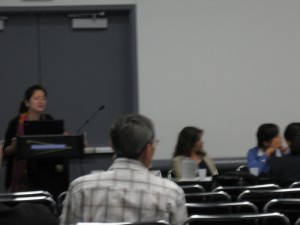




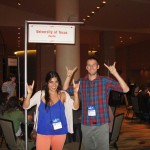
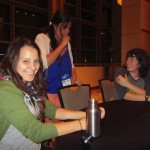
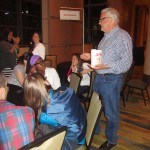
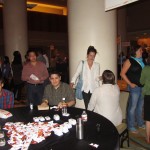
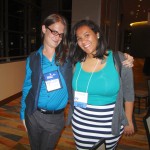
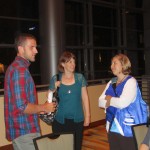
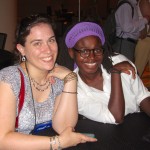
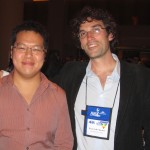
 More than 80 professors, students and alumni will showcase their work at the
More than 80 professors, students and alumni will showcase their work at the  Rank: Graduate Student, Department of Sociology, Population Research Center
Rank: Graduate Student, Department of Sociology, Population Research Center Rank: Alumna (Ph.D. Sociology, ’11/ MA Sociology, ’08)
Rank: Alumna (Ph.D. Sociology, ’11/ MA Sociology, ’08)
